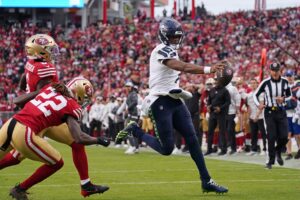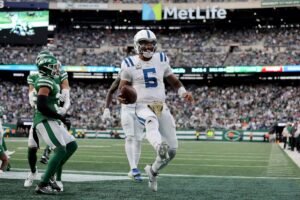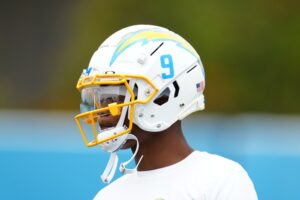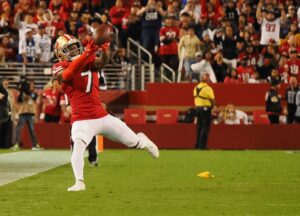Aaron Donald is mired in a continued holdout from the Los Angeles Rams camp, and there is no solution on the horizon. The number 13 overall pick in the 2014 draft, Donald signed a lucrative contract commiserate with his draft position. Per spotrac.com, his signing bonus was spread across the four-year deal, $1.4M every year. The allotted annual salary was $440K year one, $820K in 2015, $1.3M in 2016, and Donald will earn $1.8M in his fourth year in the league if he plays in 2017. Plus, as a first round draft pick, the team has the ability to pick up an option for an additional fifth year which will give him a salary of $6.8M in 2018, which they have already done.
How Greedy Is Aaron Donald?
Admittedly, this is a lot of money for the vast majority of people. Most don’t understand why the players fight for every penny and hold out on contracts that will pay them more than they could ever spend in one lifetime. Are football players this pompous? Is Aaron Donald this greedy?
Defensive Tackle Salaries
Before the question is answered, first examine the range of salaries within Donald’s chosen profession: A defensive tackle in the National Football League. This is important to bring up because it’s important to determine where in the hierarchy of defensive tackles’ salaries Donald’s lie.
Why should it matter when he is already making more money than most will see in a lifetime?
If a coworker, who performs the exact same job, got a raise and the other workers did not, questions as to why would arise. Curiosity would probably turn to anger if more coworkers are discovered who made more than, despite the fact that other worker’s production is higher, they work more hours, and actually trained the other workers on how to do the job in the first place.
Yes, the living made is comfortable, but what does that say about the bosses thinking? Donald and other NFL players have the exact same feelings and thoughts when considering their contracts.
Per spotrac.com, Aaron Donald is 34th on the list of defensive tackles in relation to his amount of “cap hit” to his team in 2017. Every team starts out with the same cap or max amount of salary they can offer the players on their team on an annual basis, and Donald checks in at $3.2M which again includes both his base salary and the amount of his signing bonus allotted to this year.
In other words, switching back to the group of coworkers in the office metaphor, if there are 64 workers (32 NFL teams, two starting defensive tackles per team, for example) then Donald is ranked in his 2017 cap hit in the bottom fifty percent of workers. The old saying “follow the money” comes to mind, and so in trying to figure out who is most important to the company, logically start at the top of the money makers.
Yet, in consecutive years 2015 and 2016, the website Pro Football Focus (henceforth, PFF) has anointed Donald as the best player in the NFL, regardless of position. This site focuses on thorough analysis of NFL players using every available stitch of data gleaned through data, statistics, and a vast understanding of what the players are required to do on any given play, and they’ve done so since 2007.
So not only is Donald woefully underpaid juxtaposed to his production in relation to his peers at defensive tackle, but on a list of 2017 cap hits Donald is all the way down at the 435th player. Arguably the best player in the NFL, and without a doubt the best player at his position, is behind 434 other players in terms of his 2017 financial compensation, including five different punters. This would be akin to the metaphorical office worker earning less than the janitorial staff!
A Hint of Reality – NFL Contract Structure
So now that Donald’s worth and how vastly underpaid he is in relation to his production has been established, it should be easy to offer him a worthwhile contract.
Not so fast, because contracts are not always what they seem in the NFL. In both professional baseball and basketball every dollar in a contract is guaranteed, regardless of production or injury for the most part. If a player signs a $250M contract, they will see every penny of it. In pro football however, nothing is guaranteed unless it is specifically stipulated as guaranteed, and even then there can be caveats.
For example, a team can cut a player at any time and not owe that player any remaining money due on their contract, unless specifically stated. There can be certain contractual inserts relating to when a player is due his bonus annually, so as to allow the team to determine they don’t want the player anymore prior to requiring the bonus payment, and give them time to cut him. The difference between a bonus payment in March and another contract’s payment in June or July is much more than just three or four months.
Guaranteed money works the same way. “Fully guaranteed” means what it says, the money under this designation is fully guaranteed, regardless of production or injury. The contract is signed, and that is the amount of money guaranteed at a justified point during the contract. There is also “guaranteed for injury” which sounds great, but is basically just a glorified life insurance policy.
In other words, the money under this allotment is guaranteed to be paid to the player in the event they get injured and cannot play that year. If the team decides they don’t want the player anymore, as long as the player can pass a physical the team won’t owe the player a dime of the “guaranteed for injury” money in the contract.
Neither teams nor player’s agents have any qualms of lumping both sections of guaranteed money into one “X amount of guaranteed” money in a given contract. Why? Teams show they pay big money to the players, and agents show they drive a hard bargain and can get their player’s the best contracts. However, as a point of interest, the only money an NFL player is promised is the amount that is “fully guaranteed.” Everything else can disappear.
Bonus money is similar. There is a “signing bonus” which is usually spread out over the life of the contract so as to lighten the annual load on the team’s cap. However, there is also a “roster bonus,” which is paid out only if the player is on the roster by a certain date, or if the team designates this as guaranteed.
Again, on a general basis no distinction is made between the two types, but are grouped together as one amount of “bonus money.” Despite the agents and team’s freedom with their announcements, the distinctions are important.
Another method of financial manipulation that teams exercise is how they allocate money in any given contract. A recent example is the contract signed by quarterback Mike Glennon, who signed with the Chicago Bears on a 3-year $45M deal. As a quarterback who barely played the last two years, and didn’t show much when he played before that, most people were blown away at the amount he got and the length of the contract. Three years with Glennon as their quarterback, for so much money?
However, per spotrac.com the amount guaranteed at the time of signing (fully guaranteed) was $18.5M. While this is a significant amount of money, Glennon’s 2017 cap hit is only $14M ($8M salary, $1M signing bonus, $5M roster bonus) and ranks 20th on the list of 2017 quarterback cap hits. The remaining $4.5M is to be paid out via 2018 guaranteed roster bonus ($2.5M) and the 2018 and 2019 allotment of his signing bonus ($1M for each year).
So for all practical purposes, Glennon’s contract is a one-year deal that allows the team to cut him after the 2017 season and only have $3.5M in dead money in 2018 and $1M in 2019. (Dead money is money that is on that year’s cap but is going to a player no longer on the roster.)
That 2018 and 2019 money is a small price to pay for the team option of either retaining Glennon at his 2018 $12.5M and 2019 $12M respective salaries or cutting him loose and saving themselves that money. And that is the crux of the matter. The teams retain control as to whether or not the player is paid and plays on their team, regardless of what amount of years and money are announced as the contract.
Fans seem to think this is fine, but get upset at players when they don’t “live up to their contract” and hold out, or don’t seem grateful for what the team has given them in their deal. Meanwhile, while the team espouses the importance of “loyalty” and a sense of honor to the players, they themselves retain the ability to cut the player whenever they deem it necessary, without any preamble or lost sleep over it.
And what did the Chicago Bears do this past 2017 NFL draft? They took quarterback Mitchell Trubisky with the second overall selection, and will apparently give him a redshirt year while Glennon is on the team in 2017. But don’t be surprised to see Trubisky get some playing time this year. Not just because Glennon won’t set the world on fire, but because the team needs to know where they stand so they can feel confident when they cut Glennon in the offseason and hand the keys to Trubisky. And since his cap hits (2018: $6.5M, 2019: $7.9M, 2020: $9.2M) are far more palatable than Glennon’s, rest assured, except for a major injury, this is what will happen.
The Power of an NFL Franchise
Back to the team’s power mentioned a moment ago; that is something that is prevalent within the NFL. Most times it is the teams who have the power and control in a given situation. If the player is under contract, then the team holds all the cards. The only time a player has power is when he is willing to hold out, or not sign a franchise tag that the team places on him (see: Le’Veon Bell).
The Rams want Donald to return to the team since he is so productive, so Donald is exercising his power to increase his financial compensation. This is not a crime, nor against the law. Yet the same metaphorical office worker raises his voice in irritation at the “greediness” of today’s athletes, even while he himself wonders how he can increase his own salary to make it commiserate with his top notch production.
Final Notes
A final note. Adam Schefter, a renowned NFL insider for ESPN, said on August 15th that “the Rams have made ‘a very strong offer.’” There was no mention of the length nor amount of money of a contract, just that it was strong, which can be subjective.
The only mention of numbers that can be found is on downtownrams.com which states Donald turned down a six-year $120M offer from the Rams, and that “it sounds like Aaron Donald is looking for an opt-out clause after the third year of the contract. A lot of Rams fans have not taken this news well.”
Previously mentioned, it is either an agent or a team that will release information to an insider. Who benefits from the above information being shared? Since it seems to cast Donald in a greedy light, it wasn’t his agent that shared this, but rather the Rams themselves. Why would an agent want his client to look bad? Notice how there is no mention of guaranteed money or bonus? The only information given is the length and the overall amount, which is in no way guaranteed unless otherwise specifically specified.
Leaking information like this is just another way for the team to try and wrestle control back from Donald as he withholds his services. And that’s fine, they’re well within their rights to do that. But don’t be like everyone else who just accepts the numbers and information at face value. Be willing to delve deeper and determine where the real truth lies, and who actually has earned the title of “greedy.”
Main Image:






